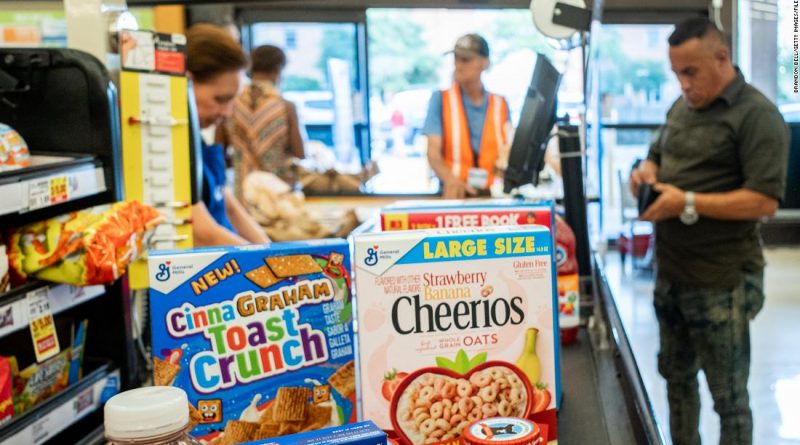Recession is likely coming. How bad will it be?
This story is part of CNN Business’ Nightcap newsletter. To get it in your inbox, sign up for free, here.
New York (CNN Business)This week is something of an earnings and econ bonanza.
We’ve got second-quarter report cards coming in from about a third of the companies in the S&P 500; a survey of consumers’ confidence (spoiler alert: it ain’t good); a pivotal interest rate decision coming Wednesday from the Federal Reserve; a reading on GDP that will fuel debate over whether we’re in a recession at this very moment; and then a cherry to top this giant data sundae: the latest headline from the Personal Consumption Expenditures Price Index — the Fed’s preferred inflation gauge — coming Friday.
(So, be kind to your local business reporters, please.)
It’s only Tuesday, but already we’ve got a lot of fresh intel to chew on. Let’s break it down.
Theme 1: Pandemic fortunes are reversing
- We’ve said it before, but it’s worth repeating: The so-called winners of the pandemic — those companies like Peloton and Zoom that catered to life in lockdown — are reckoning with the fact that people are going outside (or into the office) again.
- Exhibit A: Shopify. The e-commerce company is laying off 10% of its global staff of around 10,000 people. CEO Tobi Lutke admitted in a memo Tuesday that Shopify essentially bit off more than it could chew. It expanded too rapidly. That’s a similar tale of woe that befell Peloton, which overzealously built out production in the heyday of 2020 and is now in something of an existential crisis.
- Layoffs and hiring slowdowns are taking root across the tech sector, with companies like Google, Apple, Microsoft, Meta and Netflix either laying off staff or significantly tapping the brakes.
Theme 2: Consumers are fed up.
Everyone’s gotta eat and get to work. But consumers are increasingly finding their budgets don’t allow for much beyond those two necessities.
- Walmart shares tumbled 10% in late trading Monday after it surprised Wall Street by slashing its profit outlook and announcing markdowns to help clear a backlog of inventory. Basically, we’ve stopped buying fun things like clothes and kitchen goods because we’re spending too much on food and fuel.
- McDonald’s, meanwhile, saw sales pop even as it raised menu prices. We’re at a point when McD’s is an affordable splurge for some or a nutritional necessity for others, especially when grocery prices are up an average of 12% for the year.
- Americans are pissed off. A closely watched survey showed consumers growing even more pessimistic about the economy for the third month in a row.
- That’s important because our collective obsession with splurging on stuff we don’t need is, like, the No. 1 thing that fuels America’s giant, world-dominating economy.
Theme 3: Supply chains are still broken.
- It’s been over two years and the global supply chain hasn’t fully recovered from the turducken of chaos that knocked it offline in the spring of 2020.
- See here: General Motors saw its net profit fall 40% in the second quarter, blaming supply chain snarls that have made it difficult for virtually all industries to secure essential computer chips for the better part of two years.
BOTTOM LINE
Sadly, I don’t have a crystal ball. Best I can offer is a Magic 8 Ball answer to any question about whether we’re bound for a recession or an extended period of inflation: Reply hazy, try again.
As we wrote yesterday, stuff’s real weird right now, and technical definitions aside, many Americans already feel like it’s a recession. And it’s worth remembering, my colleague Paul R. La Monica writes, that not all recessions are created equal. Most investors aren’t expecting a 2008-level disaster, and the Fed could always reverse course and begin cutting rates to spur growth, as it did in 2001 following the dot-com crash.
NUMBER OF THE DAY: 3.2%
The International Monetary Fund offered a new and fairly grim forecast for global growth this year and next. The agency now expects major slowdowns in the three biggest economies — the United States, China and Europe — and says the global economy is likely to grow just 3.2% this year, down from 6.1% in 2021. Next year might be even worse: just 2.9%, only slightly above the 2.5% growth level that the IMF has typically considered a global recession.
KEY QUOTE: “The outlook has darkened significantly,” wrote Pierre-Olivier Gourinchas, the IMF’s director of research. “The world may soon be teetering on the edge of a global recession, only two years after the last one.”
SUPERSIZE ME
Even in a bear market, where most investors are keeping their heads down and fleeing risk, there are always a few adrenaline junkies ready to shout YOLO and do something stupid.
Enter the single-stock ETF.
Here’s the deal: An asset management firm called AXS Investments recently launched funds that let investors make supersized bets on — or against — the daily performance of individual stocks, my colleague Paul R. La Monica reports. The gist is, you can turn small bets into big gains if you can stomach the risk. (And it’s a big risk, as AXS itself takes pains to explain in its own literature about the funds.)
How it works: First off, a regular ETF, or exchange-traded fund, is nothing too exotic or especially risky. It’s a pooled investment that’s similar to a mutual fund, usually tracking a particular index or sector.
But there’s a new spin on the ETF that uses derivatives contracts to let traders amplify their positions.
For example, if you don’t buy the Tesla hype, you could short the stock, which basically means you place a wager that the share price will go down, and if you’re right you can make a tidy profit. But if you really, really believe Tesla is going down, now you can buy an ETF that offers only super-short positions on that stock.
Think of it as a turbo boost on whatever short or long position you’re taking, juicing both the risk and the rewards.
Here’s another example: Say you own a single share of Pfizer.
On Monday, your share would have gone up 1.1%.
But if you instead bought a long single-stock ETF, you’d be up 2.4%
If you had a short single-stock ETF, you’d be down 2.3%
The risks are basically endless. The Securities and Exchange Commission knows that, but it approved the products anyway. YOLO, you know?
BOTTOM LINE
AXS, the SEC and pretty much any professional financial adviser would say these things are dangerous even for seasoned traders and should be used with caution.
But, like, everyone has access to them now via brokerage apps on their phones, so, I don’t know why we should expect that inexperienced traders won’t dip their toe, or go full swan-dive, into these assets.
Remember GameStop? Anyone? Bueller?
Enjoying Nightcap? Sign up and you’ll get all of this, plus some other funny stuff we liked on the internet, in your inbox every night. (OK, most nights — we believe in a four-day work week around here.)
Source: Read Full Article



